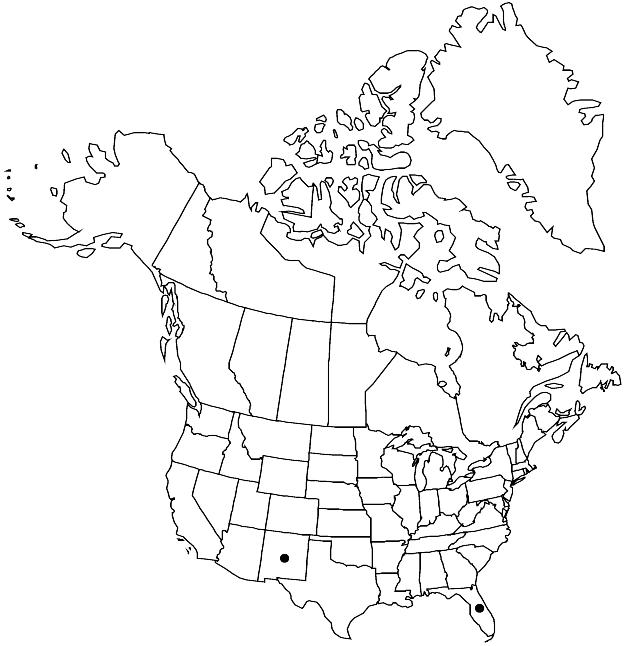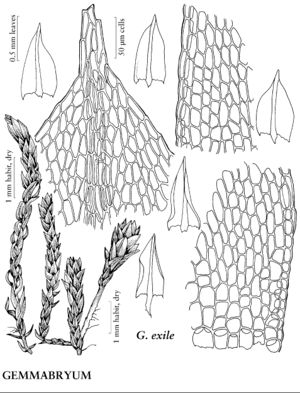Difference between revisions of "Gemmabryum exile"
Phytologia 87: 67. 2005.
FNA>Volume Importer |
FNA>Volume Importer |
||
| Line 9: | Line 9: | ||
|special_status={{Treatment/ID/Special_status | |special_status={{Treatment/ID/Special_status | ||
|code=F | |code=F | ||
| − | |label= | + | |label=Illustrated |
}} | }} | ||
|basionyms={{Treatment/ID/Basionym | |basionyms={{Treatment/ID/Basionym | ||
|name=Bryum exile | |name=Bryum exile | ||
|authority=Dozy & Molkenboer | |authority=Dozy & Molkenboer | ||
| + | |rank=species | ||
|publication_title=Ann. Sci. Nat., Bot., sér. | |publication_title=Ann. Sci. Nat., Bot., sér. | ||
|publication_place=3, 2: 300. 1844 | |publication_place=3, 2: 300. 1844 | ||
| Line 20: | Line 21: | ||
|name=Brachymenium exile | |name=Brachymenium exile | ||
|authority=(Dozy & Molkenboer) Bosch & Sande Lacoste | |authority=(Dozy & Molkenboer) Bosch & Sande Lacoste | ||
| + | |rank=species | ||
}} | }} | ||
|hierarchy=Bryaceae;Gemmabryum;Gemmabryum sect. Gemmabryum;Gemmabryum exile | |hierarchy=Bryaceae;Gemmabryum;Gemmabryum sect. Gemmabryum;Gemmabryum exile | ||
| Line 43: | Line 45: | ||
-->{{#Taxon: | -->{{#Taxon: | ||
name=Gemmabryum exile | name=Gemmabryum exile | ||
| − | |||
|authority=(Dozy & Molkenboer) J. R. Spence & H. P. Ramsay | |authority=(Dozy & Molkenboer) J. R. Spence & H. P. Ramsay | ||
|rank=species | |rank=species | ||
| Line 56: | Line 57: | ||
|publication title=Phytologia | |publication title=Phytologia | ||
|publication year=2005 | |publication year=2005 | ||
| − | |special status= | + | |special status=Illustrated |
| − | |source xml=https://jpend@bitbucket.org/aafc-mbb/fna-data-curation.git/src/ | + | |source xml=https://jpend@bitbucket.org/aafc-mbb/fna-data-curation.git/src/f50eec43f223ca0e34566be0b046453a0960e173/coarse_grained_fna_xml/V28/V28_212.xml |
|genus=Gemmabryum | |genus=Gemmabryum | ||
|section=Gemmabryum sect. Gemmabryum | |section=Gemmabryum sect. Gemmabryum | ||
Revision as of 21:12, 16 December 2019
Plants green to yellow-green. Stems 0.5–1(–2) cm, slender, stringlike when dry, evenly foliate. Leaves folded adaxially along costa around stem when dry, ovate, weakly to strongly concave, 0.4–1(–1.5) mm; margins plane; apex broadly acute-rounded; costa percurrent to short-excurrent, apiculus occasionally present; proximal laminal cells abruptly quadrate, 1:1; medial and distal cells 8–12(–14) µm wide, (3–)4–5:1. Specialized asexual reproduction by leaf axil bulbils, bulbils 1 or 2 per axil, rounded, 200–750 µm, primordia present, leafy, arising from near base or mid bulbil, and by rhizoidal tubers, brown, spheric, 100–200 µm, cells smooth. [Capsule erect, red-brown, 1–2(–3) mm; hypophysis thick, rugose; peristome strongly reduced; endostome not or occasionally partly adherent to exostome, basal membrane low, segments reduced, split, perforations absent, cilia absent].
Habitat: Concrete, rock
Elevation: low elevations (0-10 m)
Distribution

Fla., N.Mex., West Indies, Central America, South America, se Asia, Africa, Pacific Islands, Australia.
Discussion
Gemmabryum exile is one of the most distinctive and easily identified species in the genus, with very slender stringlike stems and small infolded leaves that are ovate with plane margins.
Selected References
None.
